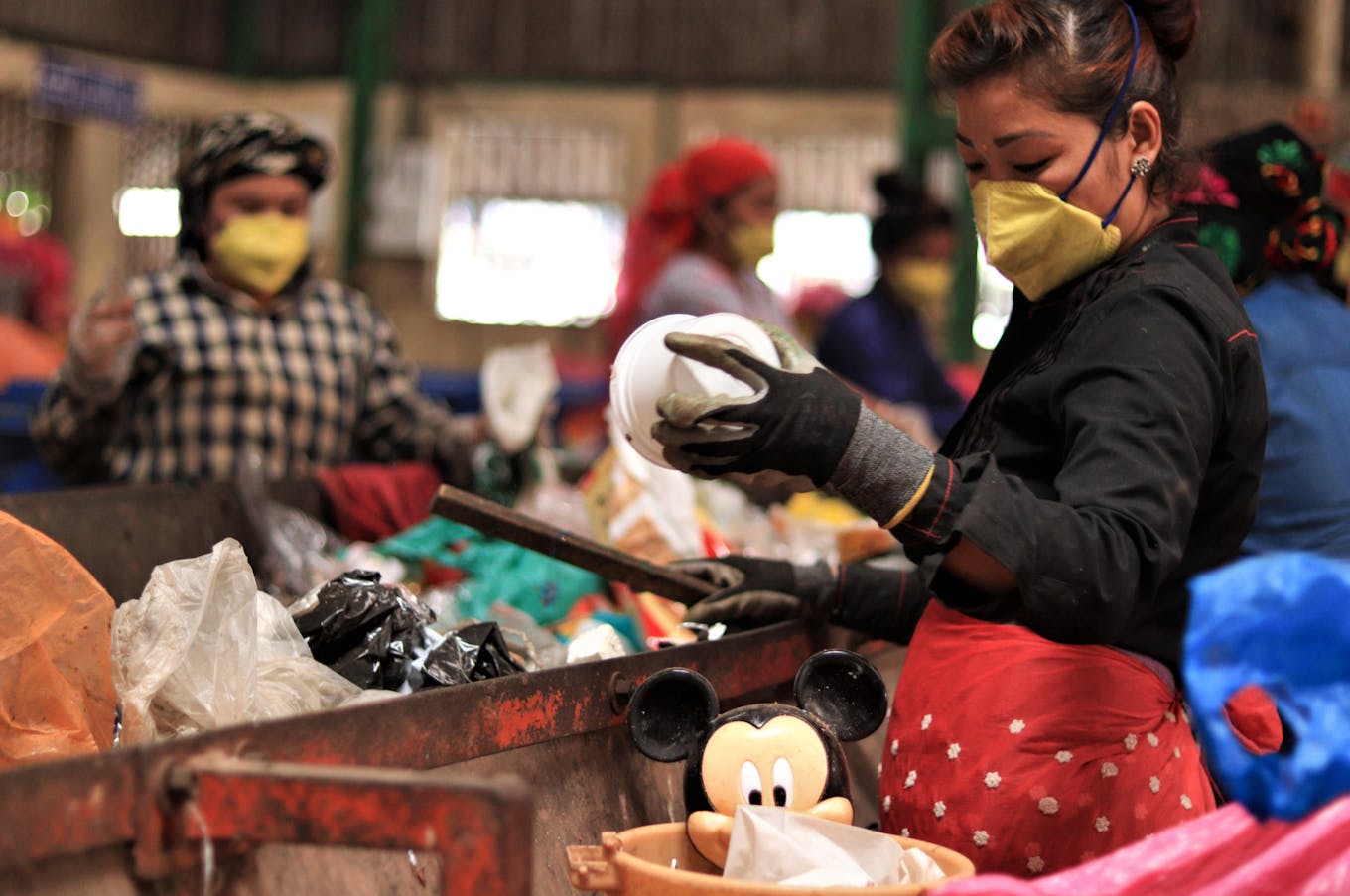A background in accounting isn’t an obvious qualification for running a waste collection and management outfit. But when Shivangi Sultania quit her job at professional services firm KPMG Consulting to join her marital family’s social enterprise, she brought along not only her business acumen and technology know-how, but also a commitment to team-building.
To continue reading, subscribe to Eco‑Business.
There's something for everyone. We offer a range of subscription plans.
- Access our stories and receive our Insights Weekly newsletter with the free EB Member plan.
- Unlock unlimited access to our content and archive with EB Circle.
- Publish your content with EB Premium.
Sultania dedicated her initial meetings with workers or sanitation partners – safaai sathis in Hindi – to understanding their problems, from poor wages to lack of childcare and healthcare facilities. “We decided to put up a display board at the facility with the current wages in the market, and updated it regularly in order to increase transparency,” she told Eco-Business. This simple step enabled her to onboard 164 safaai sathis in Jaipur, the city in western India where CDC Group, the non-governmental organisation her family runs, is headquartered.
The team also started primary education classes at work sites where volunteers taught workers’ children with the aim of getting them enrolled in government schools. Next came a tie-up with an NGO involved in preventing food waste – kits made from surplus food would be distributed among the safaai sathis frequently, improving their families’ nutrition and saving them money on food rations. Some doctors were roped in to organise quarterly health camps, and all workers were enrolled in the government-run social security programmes for provident fund and employment-related health insurance.
“My true satisfaction came from knowing that I had converted some informal rag-pickers to self-employed entrepreneurs involved in the business of handling plastic waste,” Sultania said. As CDC Group’s chief sustainability officer and chief financial officer, her efforts in empowering waste collectors across cities in India earned her a spot on the Eco-Business A-List 2022, which recognises sustainability professionals making an impact in Asia Pacific.
According to one estimate, India is home to more than 5 million sanitation workers. These largely informal workers, who are the backbone of traditional waste management in most cities, are often marginalised and at the very bottom of the socio-economic chain. In Jaipur, the project that CDC Group took over had previously faced resistance from workers due to a disagreement regarding wages. Sultania recognises that paying fair wages and ensuring constant communication with the workers are crucial.

Informal sanitation workers, form the backbone of traditional waste management in India. Image: UNDP_India / Twitter
Across the various cities that CDC Group works, Sultania also led the deployment of the latest available technologies. In the federally-governed territory of Diu, she introduced app-based monitoring of all waste collection vehicles, complete with route mapping and geofencing, so that the supervisors would always know the drivers’ whereabouts. “Before we used the software, the collection was not optimal and hence the authorities were penalising the project by Rs 33,000 (US$ 400) per month. But with the software, things changed dramatically,” she said.
Now, CDC is in the process of implementing RFID-based monitoring, tagging all households to ensure that their waste is picked up. The project currently processes 30 tonnes of waste per day. Sultania says this ensures no waste reaches the landfill or the ocean.
Sultania has also led efforts to raise awareness about at-source segregation of waste and circularity. Her team is reaching out to schools to educate students about waste management. In Delhi, for instance, a behavioural change drive is currently under way in 935 government schools, in which students from Classes 1 to 12, aged six to 18, are taught about the various types of waste, and to recognise that waste can be an asset.
In this interview, Sultania shares more on what needs to be done to improve waste management across cities in India, and the challenges she face as a sustainability practitioner working for an NGO.
Have you faced any resistance from the workers’ unions? How have you met this challenge?
Working in an industry that provides the highest number of employment opportunities to the marginalised section(s) of society comes with its own challenges. Resistance from workers is common in our sector.
We believe that the resistance is on account of the lack of social inclusion and opaqueness in the industry. It is important for us as service providers to understand the basic needs of our workers, and work towards meeting these needs; if workers are satisfied, there is no resistance.
For instance, in Mathuradas Pura in Jaipur, Rajasthan, the Centre for Development Communications Trust and the United Nations Development Programme (UNDP) established a material recovery facility called a swachhta kendra. The systematic plastic waste management system segregates, pre-processes, cleans, and dispatches materials to the appropriate registered recyclers.
When CDC took over the project on 1 October 2021, the facility was not operating at its optimal capacity. The safaai sathis were unwilling to work at the facility because the rates offered were below market rates. Our team set up a meeting with the safaai sathis, where we talked about the problems they faced. We decided to keep a board at the facility, on which the current market rates would be displayed and regularly updated in order to increase transparency. Paying fair wages enabled us to onboard 164 safaai sathis.
We established that their major concerns fell into three categories: the education of their children, rations (food and essentials) for their homes, and their health. We worked on these issues over time and implemented new policies in the system:
- We started primary education classes at our site where volunteers provided basic education to safaai sathis’ children. A few of the children later got enrolled in government schools.
- We tied up with an NGO involved in reducing food waste to distribute ration kits to our safaai sathis.
- We requested for a few doctors to conduct quarterly medical camps for our employees, free-of-charge.
We also extended the government-run social security benefits under the Provident Fund and Employees’ State Insurance Corporation to safaai sathis.
Once we started taking care of their basic needs, we faced no further resistance in running the project.
What can be done to improve waste management in India – at the city, state and national levels?
The biggest challenge in the waste management sector is that everyone is a stakeholder. There are no exceptions. Hence, action is needed at all levels.
To begin with, waste generators should be made aware of the environmental degradation all around, and should start practicing the five Rs of waste i.e. refuse, reduce, reuse, recycle, repurpose.
There should be a lot more focus on capacity building of our municipal authorities and safaai sathis on the latest and best waste management practices.
The government understands that India needs to improve the waste situation, and has been taking multiple steps. The budget allocations for waste management for the current year and [an initiative called] Mission LiFE that was introduced by our Prime Minister at COP26 also testify to the government’s efforts. However, there is a need to address the issue of funding in the sector. There has to be a gentle nudge to banks and financial institutions to provide funds for sustainable projects.
How do you like NGO work after your corporate stint? What are the challenges of running an NGO in India?
After five years of working in a large corporate environment with deep-set hierarchies, it was time for a change. I wanted to leave the consulting world and do something more challenging, and understand business in depth.
NGOs have a pragmatic approach to work and operate in flat hierarchies where the decision-making process is much faster and less complex than in a corporate organisation.
A few challenges that an NGO faces are:
- Funding, which is always a constraint.
- Multiple compliances, which sometimes demand a lot of administrative effort. These compliance rules should be in place to support NGOs and not create obstacles. For example, India’s home ministry has cancelled the Foreign Contributions Regulation Act (FCRA) registration of various NGOs, which means they can no longer receive fresh foreign funds from donors pending a probe by the home ministry. And the process of approval is very lengthy.
What are the leadership qualities one needs to work in the sustainability space?
As a leader, you need a clear understanding of purpose, and make sure that all the team members are aligned and know where they want to go. As a leader or entrepreneur, you also need to become a generalist. You have to fill multiple shoes at the same time, and have a holistic perspective.
Are there any misperceptions about working as a sustainability practitioner in India?
We do hear a lot that sustainability is expensive. I believe this is true in the short term, when you are trying to make some short-term changes in your lifestyle. However, in the long run, this is not true. The truth is if you are already living an unsustainable life, you have to spend some money upfront in order to switch to a sustainable practice. For instance, moving from plastic bags to cloth bags would require you to spend more money at the start, but it is durable and saves money in the long run.
Have you had to navigate perceptions that you are just helping to run a family enterprise? How do you face that?
When you are in the process of building something, there are multiple perceptions you will face. It is not necessary that you pay attention to them. It starts affecting your positivity. As a second-generation entrepreneur, I am grateful for the platform given to me by my father-in-law, and I hope to achieve new heights while maintaining the family’s legacy.
This interview has been edited for brevity and clarity.
Shivangi Sultania was one of 10 sustainability leaders selected for the Eco-Business A-List 2022. Read our stories with other A-List winners here.














